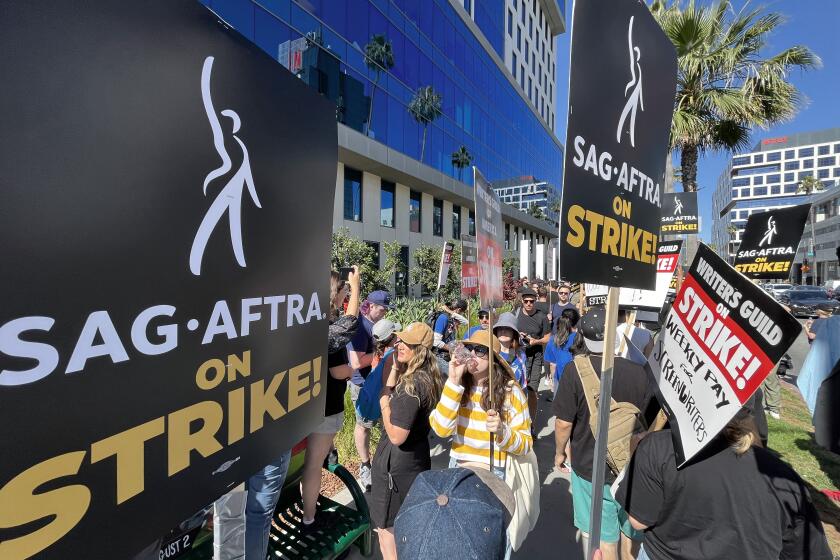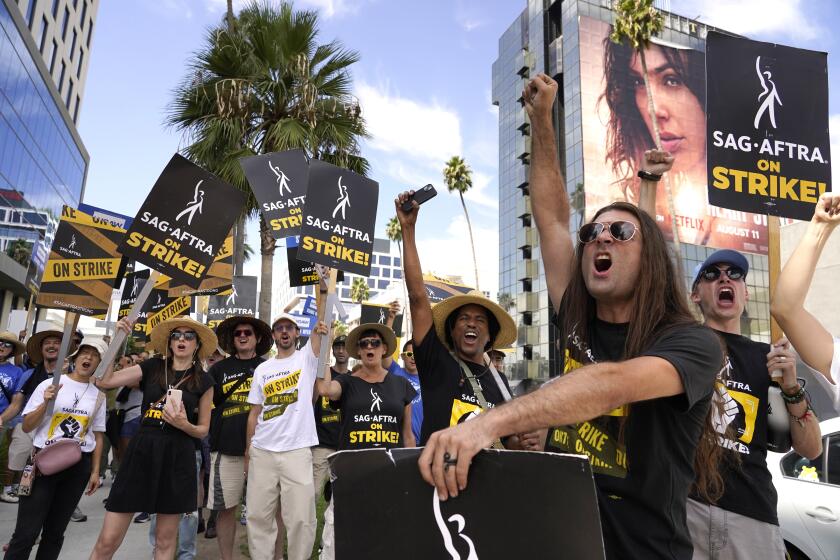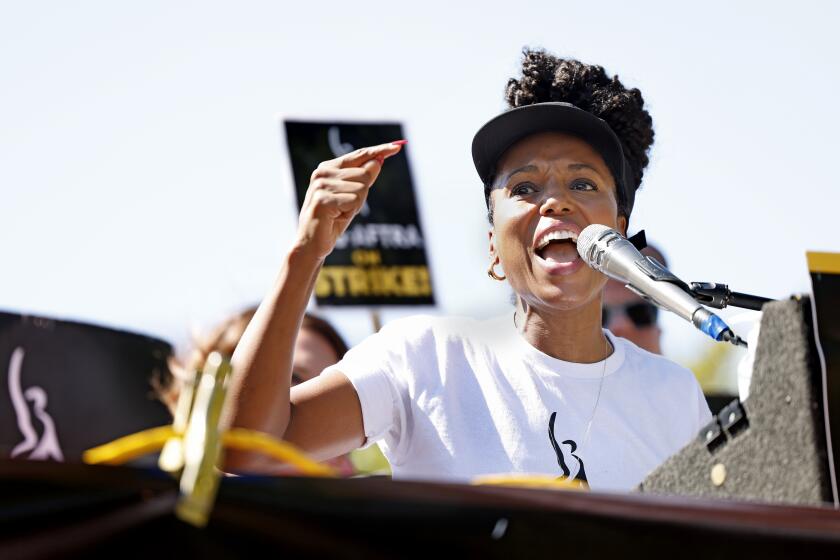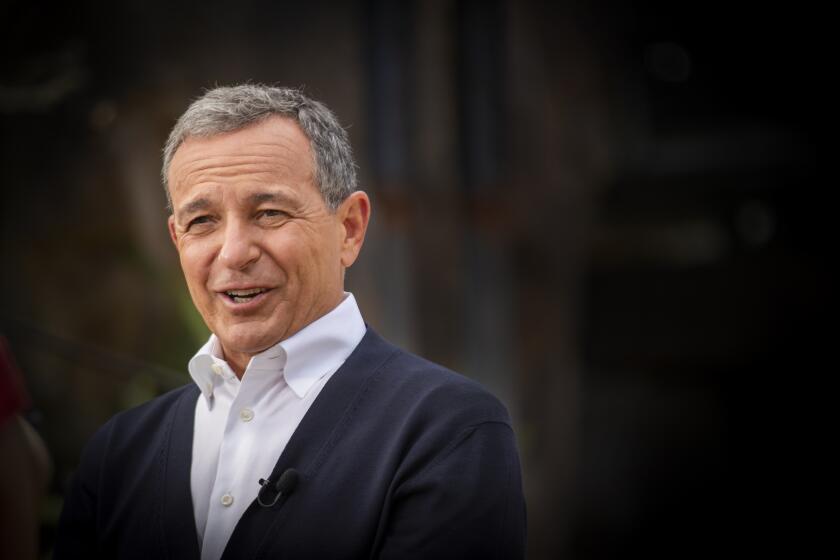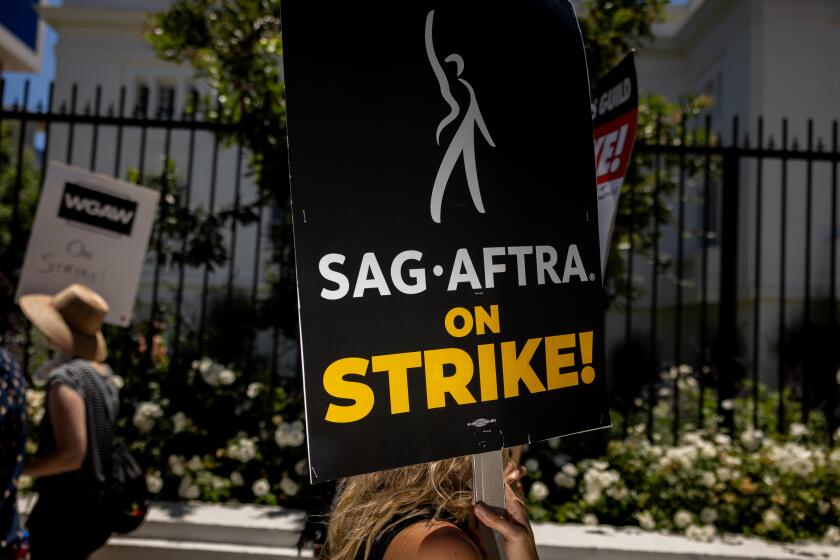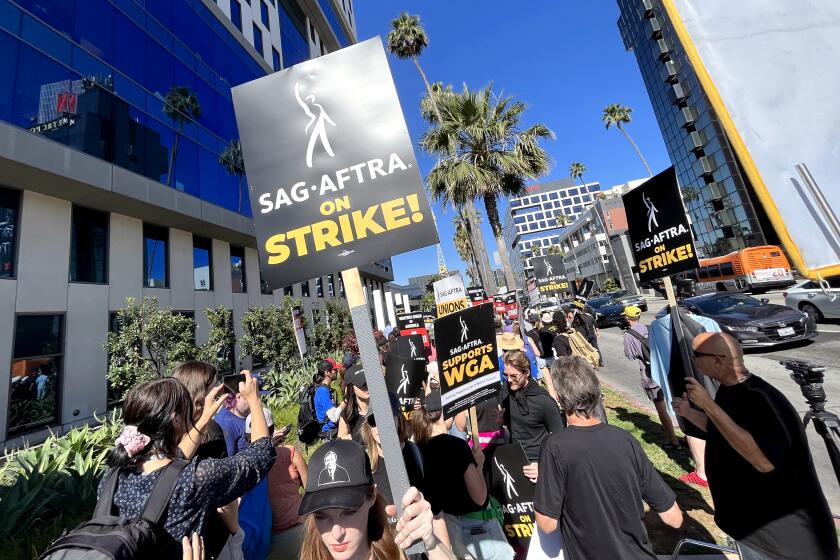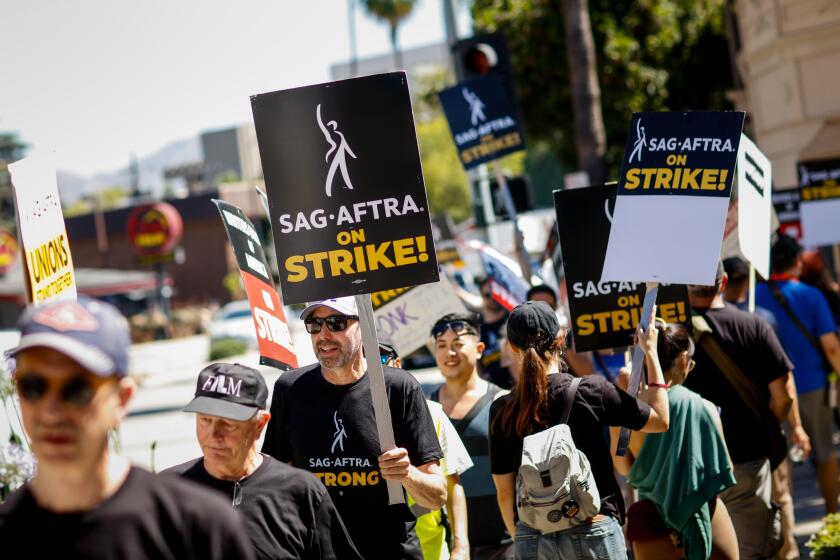Fran Drescher is SAG-AFTRA’s ‘Norma Rae.’ But the 100-day actors’ strike poses new challenges
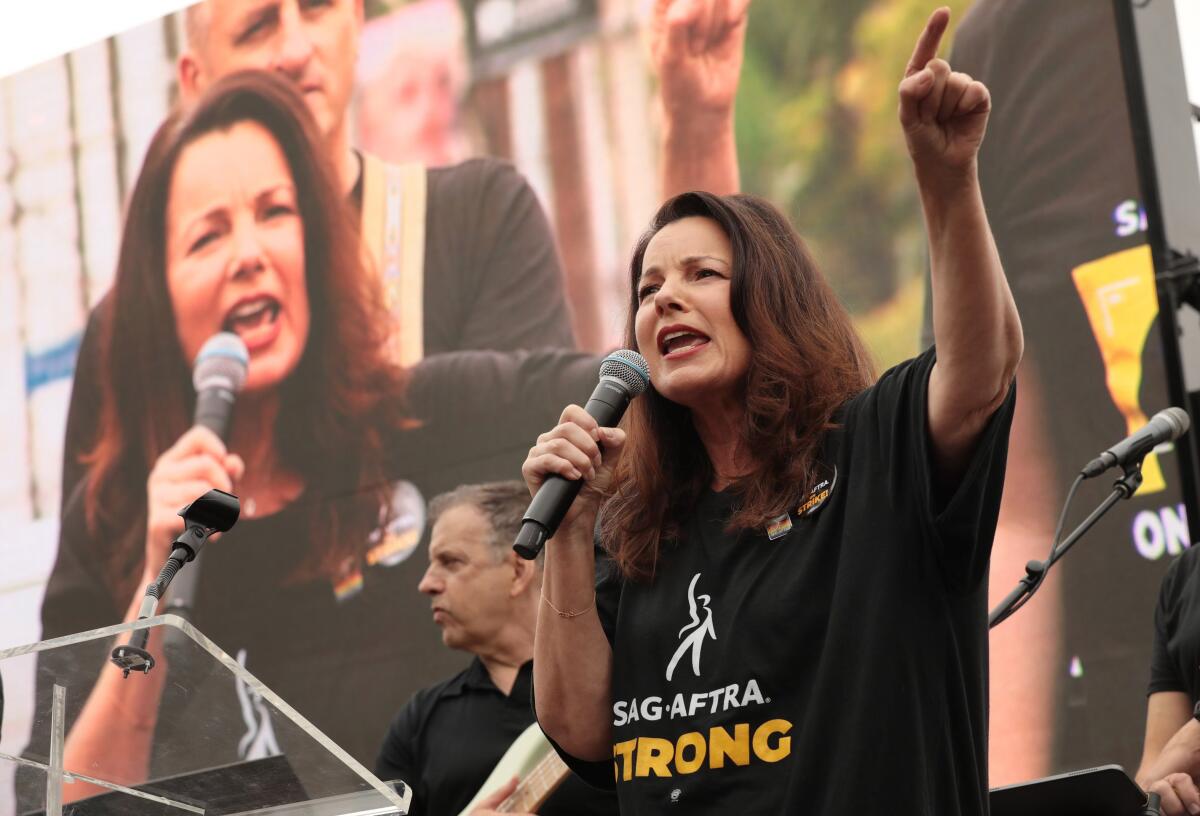
- Share via
Last summer, Fran Drescher became one of America’s most formidable labor leaders.
In taking 160,000 members of SAG-AFTRA on strike against the major Hollywood studios, and accusing chief executives of putting “Wall Street and greed” ahead of workers in a fiery July speech, the union president — best known for her sassy, nasal-voiced TV-show character in “The Nanny” — stepped into the role of a modern-day “Norma Rae.”
But now, as SAG-AFTRA members mark 100 days on strike, the unlikely champion of the underdog finds herself in a tough position.

Subscribers get exclusive access to this story
We’re offering L.A. Times subscribers special access to our best journalism. Thank you for your support.
Explore more Subscriber Exclusive content.
Actors and crew members, some who have burned through their savings, are desperate to return to work. A week ago, the very CEOs whom Drescher publicly upbraided as being “greedy,” suggesting one was an “ignoramus,” hit pause on the negotiations — dashing hopes for a feel-good October ending to Hollywood’s historic labor unrest that has idled TV and movie production since last spring.
A-list actors, including George Clooney, Ben Affleck and Scarlett Johansson, recently approached SAG-AFTRA leaders to discuss ways to resolve the strike. The stars proposed eliminating the current $1-million cap on SAG-AFTRA membership dues to raise funds for struggling actors. But the proposal, according to the guild, wouldn’t resolve the contract standoff with the studios.
“We have to figure this out — and we have to do the right thing,” Drescher said this week in an interview with The Times.
Negotiations between actors union SAG-AFTRA and the Hollywood studios hit a snag Wednesday, ending with the AMPTP saying it had suspended negotiations.
On Saturday, the union and the companies’ bargaining arm, the Alliance of Motion Picture and Television Producers, announced that the two sides would resume contract talks Tuesday, sparking hopes the actors’ strike could be resolved before the holidays.
Company executives had initially thought they could quickly reach a truce with SAG-AFTRA when talks resumed Oct. 2 — the first meeting between the two groups since before the strike began on July 14.
In late September, the AMPTP finalized a new contract with the Writers Guild of America, which was approved by 99% of writers who voted. That deal, which included higher minimum pay, higher residuals and a bonus for successful streaming shows, was intended to provide a framework for a new pact with actors.
But SAG-AFTRA’s push for streaming companies to share revenue from their subscription fees prompted last week’s breakdown in the talks.
Drescher has repeatedly implored the senior executives who have led the negotiations — Walt Disney Co. CEO Bob Iger, Warner Bros. Discovery CEO David Zaslav, Netflix co-CEO Ted Sarandos and NBCUniversal Studio Group Chairman Donna Langley — to spread more of their companies’ wealth to improve the lives of working actors.
“I’m always saying to them, you could be the heroes in this,” Drescher said. “The eyes of the industry are looking at you. Lean into what is hard but what is right.”
Three months into the actors strike, Americans still tend to sympathize more with SAG-AFTRA than the studios, according to a new poll.
Initially, SAG-AFTRA asked for 2% of all streaming revenue, which was flatly rejected. Last week, the guild proposed receiving about 57 cents a year for every streaming subscriber worldwide.
The companies balked, saying that amounted to an additional $500 million to $800 million-plus on top of the increased residuals, higher minimum fees and streaming bonuses that the AMPTP had already offered SAG-AFTRA.
Rich Greenfield, a partner and media and technology analyst at LightShed Partners, called the actors’ request “absurd.”
“They want to charge based on subscribers regardless of the revenue or profit … when they are already getting paid upfront ... regardless of whether [the] streaming content is successful,” Greenfield said.
Sign up for This Evening's Big Stories
Catch up on the day with the 7 biggest L.A. Times stories in your inbox every weekday evening.
You may occasionally receive promotional content from the Los Angeles Times.
Drescher countered that companies must recognize that Hollywood workers, including some actors, “cannot make a living anymore.”
The industry’s move to streaming has created an “economic dystopia,” Drescher said, because streaming services typically order far fewer episodes of TV series than traditional linear television does. Most streaming services also do not release detailed viewership data — leaving artists in the dark as to whether they are being properly paid (the WGA’s deal with the studios allows the guild to access streaming viewership data on a confidential basis).
“The members are suffocating in this vacuum-sealed box,” Drescher said.
And she said she’s not budging on important deal terms.
“My members need something significant in terms of compensation specifically in streaming video-on-demand,” she said. “I will not cave and I will not let them down, no matter what vitriol or intimidation tactics the companies choose to throw at me.”
Drescher brings an unconventional style to the labor fight. A survivor of cancer and of sexual assault, the sitcom star has approached negotiations with a goal of encouraging others to bring out the best in themselves.
She carries a heart-shaped plush toy with a smiley face — a gift from an 11-year-old fan — and props it on the negotiating table, where she sits opposite Iger.
Drescher offers Buddhist incantations, and during one tense session, she instructed various negotiators to “dial it down.” Drescher, 66, then shared a poignant story about a conversation she’d had with her 94-year-old father.
“She’s been an extremely effective advocate on behalf of our members and she has helped convey the importance of several of these proposals and why they are essential to our members and their ability to make a living in the industry,” SAG-AFTRA Chief Negotiator Duncan Crabtree-Ireland said. “She has tremendous credibility both with our membership and across the table, and she’s also served as a calming influence in the room at times when their passions get high.”
But Drescher’s rhetoric fueled very high expectations among the actors who have walked miles on picket lines in Los Angeles and New York since mid-July.
“If we don’t stand tall right now, we are all going to be in trouble,” Drescher told members in July, minutes after the guild’s board voted unanimously to call the strike. “We are all going to be in jeopardy of being replaced by machines and big business who cares more about Wall Street than you and your family. At some point, you have to say no.”
Her words touched a chord amid a nationwide rise in labor action.
The National Day of Solidarity rally in Burbank featured speeches from Kerry Washington, Martin Sheen and Ron Perlman, drawing thousands of members from a multitude of labor groups showing solidarity for the WGA and SAG-AFTRA.
Throughout the summer and fall, actors and striking WGA members were joined on picket lines by nurses, county workers, Teamsters and members of the International Alliance of Theatrical Stage Employees, which represents film set workers.
“We are all suffering for this” cause, said camera operator Gabriel Diniz, a member of IATSE Local 600, while picketing outside Disney’s headquarters in Burbank earlier this week. “But what helps one group is going to help the others.”
Company executives are frustrated. Despite making concessions to SAG-AFTRA, some executives recognize the labor action has swelled into a proxy for a larger political movement to correct America’s wealth inequality.
The stakes were heightened in late June, when A-list actors including Meryl Streep, Jennifer Lawrence and Amy Schumer signed a letter telling SAG-AFTRA leaders not to settle for anything less than a “transformative deal.”
The companies also are in a jam. When the WGA strike started in May, some executives were secretly relieved because the film and TV production shutdowns allowed their companies to save hundreds of millions of dollars at a time when their finances were under strain.
Disney CEO Bob Iger announced in February that the company would shed 7,000 jobs after losing billions on streaming. Layoffs begin this week.
As negotiations resume this week, the two sides are hoping to find a path to a deal. The companies are pressing for SAG-AFTRA to give up on its revenue-sharing demands. Sarandos, the Netflix co-chief, lamented earlier this month that SAG-AFTRA’s counteroffer on revenue sharing was a “bridge too far.”
The industry fears that a walkout that extends through year’s end could deeply damage the theatrical movie business, which has not recovered from the COVID-19 pandemic shutdowns.
Since May, 45,000 jobs in the entertainment and sound recording industry have been erased from payrolls, “reflecting the impact of the labor disputes,” according to the U.S. Bureau of Labor Statistics.
In California, the twin strikes are expected to cause about $6.5 billion in economic damage, said Todd Holmes, associate professor of entertainment media management at Cal State Northridge. Local businesses that rely on the entertainment industry, such as prop houses, restaurants, couriers and talent management firms, also have suffered financially.
If the SAG-AFTRA strike continues into late November, the total economic fallout will rise to more than $8 billion, Holmes estimates.
SAG-AFTRA has approved a deal from the studios to end its historic strike. The actors were on strike for more than 100 days.
The strained situation has prompted some second-guessing of how SAG-AFTRA leaders have handled bargaining.
“You’re not winning an Oscar for this negotiation,” Endeavor CEO Ari Emanuel said last week at a Bloomberg media conference in an attempt to prod the two sides to resume bargaining sessions.
Actor Kristen Schaal (“The Last Man on Earth,” “Bob’s Burgers”) said this week while picketing at Disney that she can see why there is so much frustration and pushback from the studio side.
“I bet they’re grumbling. Fran is standing up to them — and they’re not used to that,” Schaal said. “This is a historical time, the business has changed, and these executives need to see that.”
How did talks between actors and studios collapse, resulting in the first strike under the film and TV contract since 1980?
Drescher’s moxie landed her on network TV.
More than 30 years ago, she spotted a CBS executive while on a transatlantic flight and made an initial pitch about portraying a door-to-door cosmetics salesperson who needs work and takes a job as a nanny. Then-L.A. Times TV critic Howard Rosenberg wrote in 1993 that Drescher had become “the most distinctive voice in prime time.”
CBS initially wanted the character to be Italian — but Drescher refused.
“‘The Nanny’ Is Jewish and Proud of It,’ ” Drescher wrote in a 1994 essay in The Times. “I created Fran Fine based very closely upon my mother, myself and all the wonderful and rich characters I grew up around in Flushing, Queens.”
In the series, Fran Fine nudges a group of uptight charges — the Sheffields — into different ways of thinking.
Perhaps it’s a bit like her current role as she struggles opposite the studio chiefs.
“I look to my Buddhist philosophy of trying to elevate people’s thinking so that they’re not so greed-driven,” Drescher said, noting that she also looks to “people like Frederick Douglass, who said, ‘Power concedes nothing without a demand. It never has and it never will.’ [And] to people like Eleanor Roosevelt, who said women are like teabags. We never know how strong we are until we’re put in hot water.”
As SAG-AFTRA members join writers on picket lines, the fallout will disrupt Hollywood film and TV productions worldwide. ‘There’s going to be blood in the water,’ said one analyst. ‘This will not end well.’
Drescher was first elected SAG-AFTRA president two years ago in a closely watched contest that highlighted long-standing divisions within the guild.
There were some early missteps.
Drescher, who is vaccinated for COVID-19, also raised concerns about studio employers requiring workers on film and TV shows to be vaccinated and suggested that the union review new evidence about the effectiveness of vaccines and boosters. “What’s next, we can’t work without a monkeypox vaccine?” she asked.
She called a special meeting to discuss the vaccine mandates last year but the board voted to take no action.
Drescher also raised eyebrows when she flew to Italy in the middle of negotiations to appear at a fashion show. The union said she was fulfilling a scheduled commitment to work as a brand ambassador for Dolce & Gabbana.
“As soon as the strike started, Fran rose to the occasion,” said Jeff Torres, a SAG-AFTRA strike captain. “She’s been able to unite people. She’s someone that we can rally around because she is speaking truth to power.”
Drescher was reelected this year, with 81% of the vote.
On the picket lines, guild members have saluted Drescher’s strong stand during negotiations.
“There have been times in my career where SAG has sort of rolled over in negotiations,” actor Schaal said. “This is the first time that it’s like, ‘Woo!, SAG is standing strong.’”
In “The Nanny,” Drescher’s character winds up marrying her employer — a theater producer and the family patriarch.
But it’s not clear what it will take to unite Drescher and media executives.
Andrea Schneider, director of the Kukin Program for Conflict Resolution at Yeshiva University’s Cardozo School of Law, said the suspension of the talks earlier this month, when the studios walked away, was a “classic negotiation ploy.”
“We are in Hollywood, and this is good acting: ‘I’m offended. I’m appalled. There’s no way we could ever give up this money,’” Schneider said of the studios. “But they’ve made progress and I don’t think either side wants to throw that all away.”
More to Read
Sign up for This Evening's Big Stories
Catch up on the day with the 7 biggest L.A. Times stories in your inbox every weekday evening.
You may occasionally receive promotional content from the Los Angeles Times.
